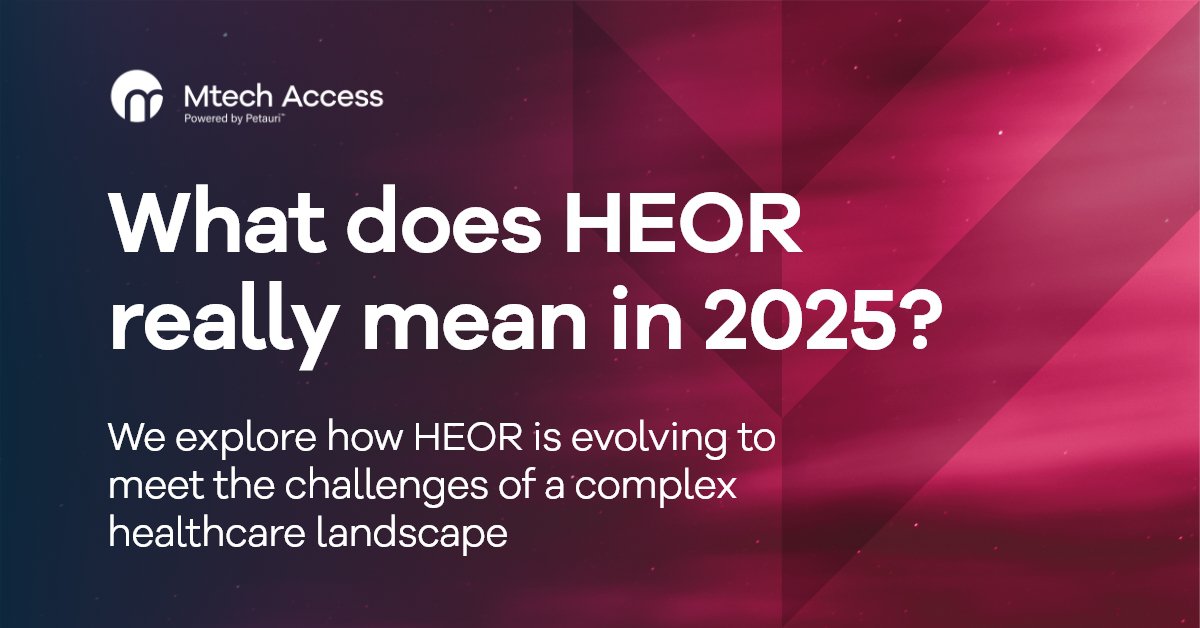
Global healthcare systems are under unprecedented strain. As life expectancies rise and populations age, the proportion of people aged 60+ years is expected to soar. This both signals remarkable progress and poses immense challenges. The demographic shift intensifies the need for smarter, evidence-driven tools to navigate increasingly complex healthcare decisions. For decades, life sciences professionals have turned to Health Economics and Outcomes Research (HEOR) to assess the clinical and economic value of health technologies.
But HEOR is evolving. The methodologies that underpin it are diversifying as Pharma and Medtech companies experiment with new ways to generate, synthesise, and evaluate evidence. In this changing landscape, we ask: what does HEOR really mean in 2025?
The HEOR evolution
20 years ago, ‘outcomes research’ was a catch-all phrase for studies not directly related to clinical trials. Today, systematic literature review (SLR) and network meta-analysis (NMA) have become distinct specialisms in their own right, and the term real-world evidence (RWE) has grown to encompass a broad and sometimes confusing range of activities. Likewise, where once the range of health economic model structures could be counted on one hand, now economists use a range of advanced modelling techniques from partitioned survival modelling (now commonly used to show the value of some of the most innovative cancer treatments) to regression-based modelling (where real-world data can be incorporated to better estimate relationships between variables).
Whilst these innovations have added depth to the field, they have also contributed to a dilution of the once-clear term: HEOR.
The healthcare landscape is undeniably growing in complexity, with rising life expectancies, ageing, rare, and complex populations (e.g. with genetic mutations), and increasing pressures on systems pushing decision-makers to look for solutions that address cost, value, and outcomes. HEOR is often positioned as the answer to these challenges. However, its broad scope may obscure the concrete deliverables decision-makers need.
So, what does HEOR really mean in 2025? Is it a term that's still relevant, or has it become just another buzzword?
The continued relevance of HEOR
Despite the confusion, HEOR remains a significant term in Pharmaceutical and Medtech industries. Many professionals still hold HEOR-related job titles, and the term is embedded in the vocabulary of health research.
HEOR has expanded its remit to include emerging methodologies, such as big data analytics and artificial intelligence (AI), positioning itself as a modern, data-driven discipline (we presented research on the accuracy and efficiency of automated or AI tools in SLRs at ISPOR Europe).
Even as some of its components evolve into separate disciplines, HEOR continues to capture the essence of evaluating the economic and human impact of medical treatments.
The ongoing need for HEOR outputs
The traditional outputs of HEOR, such as health economic models, NMA, and synthesised evidence, are indispensable for successful market access. These outputs directly align with the goals of Pharmaceutical and Medtech professionals: securing positive health technology assessment (HTA) recommendations, optimising pricing and reimbursement decisions, and addressing payer concerns around clinical and economic uncertainty.
For instance, in European markets, HEOR insights might focus on cost-effectiveness thresholds and health system affordability, whereas in the US, robust real-world data and patient preference studies can differentiate products for commercial payers seeking value-based care solutions. In Asia–Pacific markets, evidence often needs to address healthcare access disparities and demonstrate cost efficiency for treatments within resource-limited settings. Meanwhile, in emerging markets, HEOR may be critical in supporting priority-setting frameworks to optimise scarce healthcare budgets.
HEOR’s role in payer engagement
For Pharma and Medtech professionals, the growing importance of payer engagement makes HEOR outputs more critical than ever. Health economic models, real-world evidence, and patient-centred outcomes provide the robust evidence that payers need to make funding decisions.
Whilst HTA markets rely on systematic comparisons of clinical and economic data, payers in less formalised systems still value strong evidence that demonstrates cost effectiveness, patient impact, and affordability. Aligning HEOR deliverables to payer priorities ensures its outputs remain relevant and actionable across markets.
Our approach: Defining HEOR for today’s challenges
HEOR is often positioned as a global framework for evaluating healthcare value, even in resource-limited markets. However, such broad claims about HEOR’s global applicability may overlook the need for more specific outputs, such as context-driven analyses, priority-setting frameworks, or data synthesis tailored to local realities.
Across Petauri™, we embrace the breadth and adaptability of HEOR, recognising that its meaning can vary depending on the context. Our strength lies in the diverse range of specialisms within our team, enabling us to support clients across the entire HEOR spectrum.
Whether it’s strategically advising clients on the most relevant methods and tools, helping them cut through the noise to identify the deliverables they truly need, or producing technical outputs to the highest standard, we ensure HEOR works for today’s challenges. The challenge isn’t that HEOR is meaningless; rather, it’s that it means different things to different people – and we’re equipped to meet those varied needs.
Conclusion: HEOR as a flexible, useful framework
In 2025, HEOR may no longer be a neatly defined discipline, but its relevance is clear. For Pharma and Medtech professionals tasked with evidence generation, HEOR offers a flexible, multidisciplinary framework to tackle specific challenges, whether it’s generating economic models for HTA submissions, delivering robust real-world evidence for payers, or creating outcome frameworks that matter to patients.
Rather than focusing on what HEOR ‘is,’ the key is to align its outputs with decision-makers’ priorities. By breaking HEOR into tangible deliverables, we can demonstrate value and support impactful market access decisions.
To speak to our evidence experts about your global HEOR requirements, contact us today.


